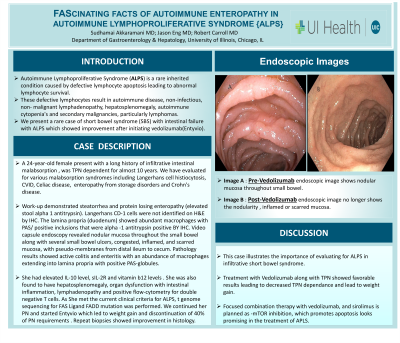Tuesday Poster Session
Category: Small Intestine
P4156 - FAScinating Facts of Autoimmune Enteropathy in Autoimmune Lymphoproliferative Syndrome
Tuesday, October 24, 2023
10:30 AM - 4:00 PM PT
Location: Exhibit Hall

Has Audio

Sudhamai Akkaramani, MD
University of Illinois at Chicago
Chicago, IL
Presenting Author(s)
Sudhamai Akkaramani, MD, Jason Eng, MD, Rohit Agrawal, MD, Robert Carroll, MD
University of Illinois at Chicago, Chicago, IL
Introduction: Autoimmune Lymphoproliferative Syndrome (ALPS) is a rare inherited condition caused by defective lymphocyte apoptosis leading to abnormal lymphocyte survival. These defective lymphocytes result in autoimmune disease, non-infectious, nonmalignant lymphadenopathy, hepatosplenomegaly, autoimmune cytopenia’s and secondary malignancies particularly lymphomas. We present a rare case of Short Bowel Syndrome(SBS ) with intestinal failure with ALPS which showed improvement after initiating vedolizumab (Entyvio).
Case Description/Methods: A 24-year-old female presented to us from childhood with infiltrative intestinal malabsorption. She had been on Parenteral Nutrition (PN)for almost 10 years. As the differential diagnosis was broad, we evaluated for various malabsorption diseases including langerhans cells histiocytosis, CVID, enteropathy from storage or metabolic disorders, celiac disease, and Crohn's disease.
Work-up demonstrated steatorrhea and protein losing enteropathy (elevated stool alpha 1 antitrypsin(A1AT). Langerhans CD-1 cells were not identified on H&E by immunohistochemistry (IHC). The lamina propria (duodenum) showed abundant macrophages with PAS positive inclusions that were alpha -1 antitrypsin positive by IHC. Video Capsule Endoscopy revealed nodular mucosa throughout the small bowel along with several small bowel ulcers, while the colonoscopy showed congested, inflamed, scarred with pseudo-membranes from distal ileum to cecum. Pathology results showed active colitis and enteritis with abundance of macrophages extending into lamina propria with positive PAS globules.
She had elevated IL-10 level, sIL-2R and vitamin b12 levels. She has hepatosplenomegaly, organ dysfunction and inflammation in the intestine, non-malignant, non-infectious lymphadenopathy, and positive flow-cytometry for double negative T cells. She meets the current clinical criteria for ALPS and genome sequencing for FAS Ligand FADD mutation were sent. We continued her PN and started Entyvio which led to weight gain and discontinuation of 40% PN requirements. Repeat biopsies showed improvement in histology.
Figure A and Figure B shows Endoscopic images pre treatment and post treatment with Vedolizumab.
Discussion: This case illustrates the importance of evaluating for ALPS in infiltrative short bowel syndrome. A focused combination therapy with vedolizumab and sirolimus is planned, as M-TOR inhibition promotes apoptosis. This therapy looks promising in the treatment of APLS.

Disclosures:
Sudhamai Akkaramani, MD, Jason Eng, MD, Rohit Agrawal, MD, Robert Carroll, MD. P4156 - FAScinating Facts of Autoimmune Enteropathy in Autoimmune Lymphoproliferative Syndrome, ACG 2023 Annual Scientific Meeting Abstracts. Vancouver, BC, Canada: American College of Gastroenterology.
University of Illinois at Chicago, Chicago, IL
Introduction: Autoimmune Lymphoproliferative Syndrome (ALPS) is a rare inherited condition caused by defective lymphocyte apoptosis leading to abnormal lymphocyte survival. These defective lymphocytes result in autoimmune disease, non-infectious, nonmalignant lymphadenopathy, hepatosplenomegaly, autoimmune cytopenia’s and secondary malignancies particularly lymphomas. We present a rare case of Short Bowel Syndrome(SBS ) with intestinal failure with ALPS which showed improvement after initiating vedolizumab (Entyvio).
Case Description/Methods: A 24-year-old female presented to us from childhood with infiltrative intestinal malabsorption. She had been on Parenteral Nutrition (PN)for almost 10 years. As the differential diagnosis was broad, we evaluated for various malabsorption diseases including langerhans cells histiocytosis, CVID, enteropathy from storage or metabolic disorders, celiac disease, and Crohn's disease.
Work-up demonstrated steatorrhea and protein losing enteropathy (elevated stool alpha 1 antitrypsin(A1AT). Langerhans CD-1 cells were not identified on H&E by immunohistochemistry (IHC). The lamina propria (duodenum) showed abundant macrophages with PAS positive inclusions that were alpha -1 antitrypsin positive by IHC. Video Capsule Endoscopy revealed nodular mucosa throughout the small bowel along with several small bowel ulcers, while the colonoscopy showed congested, inflamed, scarred with pseudo-membranes from distal ileum to cecum. Pathology results showed active colitis and enteritis with abundance of macrophages extending into lamina propria with positive PAS globules.
She had elevated IL-10 level, sIL-2R and vitamin b12 levels. She has hepatosplenomegaly, organ dysfunction and inflammation in the intestine, non-malignant, non-infectious lymphadenopathy, and positive flow-cytometry for double negative T cells. She meets the current clinical criteria for ALPS and genome sequencing for FAS Ligand FADD mutation were sent. We continued her PN and started Entyvio which led to weight gain and discontinuation of 40% PN requirements. Repeat biopsies showed improvement in histology.
Figure A and Figure B shows Endoscopic images pre treatment and post treatment with Vedolizumab.
Discussion: This case illustrates the importance of evaluating for ALPS in infiltrative short bowel syndrome. A focused combination therapy with vedolizumab and sirolimus is planned, as M-TOR inhibition promotes apoptosis. This therapy looks promising in the treatment of APLS.

Figure: Figure A : Pre-Vedolizumab Treatment : Endoscopic view showing inflamed, congested mucosa.
Figure B : Post-Vedolizumab Treatment : Endoscopy Shows improved inflammation and congestion of intestinal mucosa.
Figure B : Post-Vedolizumab Treatment : Endoscopy Shows improved inflammation and congestion of intestinal mucosa.
Disclosures:
Sudhamai Akkaramani indicated no relevant financial relationships.
Jason Eng indicated no relevant financial relationships.
Rohit Agrawal indicated no relevant financial relationships.
Robert Carroll: Takedz – Speakers Bureau.
Sudhamai Akkaramani, MD, Jason Eng, MD, Rohit Agrawal, MD, Robert Carroll, MD. P4156 - FAScinating Facts of Autoimmune Enteropathy in Autoimmune Lymphoproliferative Syndrome, ACG 2023 Annual Scientific Meeting Abstracts. Vancouver, BC, Canada: American College of Gastroenterology.
